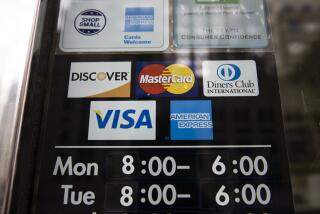Junk Bond Defaults at Highest Level in 20 Years : Finance: The failure rate on high-yield securities has been 5.8% so far this year.
- Share via
NEW YORK — Junk bond defaults rose in the first half of 1990 to a rate that, if sustained the rest of the year, would generate the highest corporate bond default rate in 20 years, an investment service says.
In the first seven months of the year, 32 high-yield bond issuers defaulted--a default rate of 5.8%, according to John Lonski, chief economist at Moody’s Investor Service Inc.
If maintained, it would be the highest default rate since the collapse of the Penn Central railroad accounted for a 10.9% rate in 1970, Lonski said.
Analysts say a weak economy and higher oil prices make it a good possibility that the near-record default rate this year will be sustained.
As the economy slows and higher gasoline and heating oil prices leave consumers with less money to spend in casinos, department stores and on new homes, businesses will have less cash to make interest and principal payments, Lonski said.
“I don’t think we’ve passed the bottom yet in all likelihood, especially for the highly leveraged firms that depend on discretionary income,” he said.
Prices of issues that usually ride up and down with the business cycle have taken a pounding since Iraq overran Kuwait on Aug. 2, causing oil prices to skyrocket.
Numbers compiled by Citicorp show that returns on junk bonds issued by recession-prone industries suffered the most in the first half of August. Casinos dropped 7.8%, building materials fell 7.1% and retailers were off 3.6%.
Toilet maker American Standard Inc., which relies heavily on energy in making its ceramics, saw its 12 7/8% senior subordinated debentures, which mature in the year 2000, skid from 93 to the high 80s last week.
Junk bonds are debt securities typically issued by companies that lack investment-grade credit. Often used to raise capital for expansion, they carry high interest rates to compensate for their risk.
A recession would hit steeply leveraged companies particularly hard because their fixed costs include huge principal and interest payments, Lonski said. When looking to cut expenses, capital spending and employment are likely to be hit harder than if a company didn’t have a high debt obligation.
Even industries such as food, tobacco and health care, whose fortunes tend to resist economic downturns, could be hurt as consumers resist price hikes that heavily indebted companies have relied upon to boost cash flow, Lonski said.
Citicorp’s numbers show returns on health-care issues dropping 0.9% and broadcasting issues 1.7% in the first half of August.
On the other side of the coin, there are likely to be some bond-issuing winners in the post-Iraqi invasion climate. One segment, Lonski said, is utilities that rely heavily on nuclear power to produce electricity.
Arizona Public Service Co. and Philadelphia Electric Co. are examples of utilities with speculative-grade bonds that have substantial nuclear-power generating capabilities, he said.
More to Read
Inside the business of entertainment
The Wide Shot brings you news, analysis and insights on everything from streaming wars to production — and what it all means for the future.
You may occasionally receive promotional content from the Los Angeles Times.










